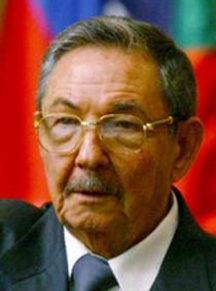HAVANA, (Reuters) – President Raul Castro defended Cuba’s one-party political system as a bulwark against U.S. imperialism and said it would remain as it is in a speech yesterday to a Communist Party conference.

Castro also said previously announced plans to put term limits on the country’s leaders were not fully official, but could gradually go ahead.
This weekend’s conference, which is the first in the party’s history, came amid wide-ranging reforms that have given Cubans the right to open small businesses and to buy and sell cars. But there have been no promises of significant political change.
Castro held to that line in his speech when he railed against the United States, Cuba’s longtime ideological foe, and its political system and said the Caribbean island 90 miles (145 km) from Florida intended to remain a one-party state.
The Communist Party is the only legal political party in Cuba and, under a national constitution in effect since 1976, the supreme guiding force of the society and the state.
“In Cuba, based on its experience in the long history of the fight for independence and national sovereignty, we defend the one-party system instead of the demagoguery and commercialization of politics,” Castro said.
He said permitting additional parties would open the door to U.S. interference. It “would be the equivalent of legalizing a party of imperialism on our soil,” Castro said.
While the party will remain unchallenged, Castor said the country’s leaders will be limited to two consecutive five-year terms, an idea he first mentioned at a party congress in April.
Castro said the party was still working out the legal measures for term limits, which will require a change to the constitution, but that implementation could begin “gradually, even before the constitution is changed.”
He did not explain how that would be done or when it might start.
Term limits would be a break from the past in the Cuba, where Fidel Castro ruled for 49 years after the 1959 revolution and was succeeded by Raul Castro, his younger brother. They also could help bring new blood into the government, whose current leaders are elderly and have no obvious replacements.
Raul Castro is 80, his vice president Jose Ramon Machado Ventura is 81 and Fidel Castro, now mostly retired but still present behind the scenes, is 85.
There was talk before the conference that the party might impose age limits on leaders and promote younger people into the party hierarchy, but there has been no mention of either.
Bert Hoffmann, a Cuba specialist at German Institute of Global Area Studies in Hamburg, said the message of the conference appeared to be “to downplay any expectations that economic reforms might entail political change.”
